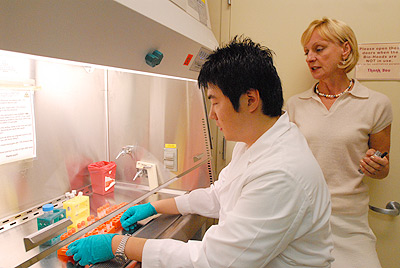Berkeleyan
 |
Professor of Genetics and Technology Nina Holland of the School of Public Health helps undergraduate-student researcher Seung Pak with his honors project.(UC Berkeley School of Public Health) |
Public-health worker shortage will leave the nation vulnerable, according to new ASPH report
Experts at the School of Public Health confirm that the crisis will have an impact on California
![]()
| 05 March 2008
While natural disasters, the threat of bioterrorism, and other health concerns take their toll on public-health resources, the United States is facing a major public-health workforce crisis, according to a report issued Feb. 27 by the Association of Schools of Public Health (ASPH). This crisis could have an impact on the health of every American, the report asserts, unless there is an immediate influx of funding for recruitment and training of public-health professionals.
The report, a first-of-its-kind assessment, found that more than 250,000 additional public-health workers are needed by 2020.
The crisis is a culmination of already documented and forecasted shortages of public-health physicians, public-health nurses, epidemiologists, and health-care educators and administrators, along with other contributing factors, such as an expected spike in retirements, the ASPH analysis says. Some 23 percent of the current workforce - almost 110,000 workers - will become eligible to retire during the next presidential term, according to the report.
California has the largest elderly population in the nation, and this group is expected to grow at more than twice the rate of the total population between now and 2020. With aging comes increased prevalence of chronic illnesses and the emergence of other needs served by the public-health system, as well as depletion of the public-health workforce itself due to retirement. In California, 50 percent of the governmental public-health workforce is scheduled to retire within the next five years, according to University of California data.
In addition, the existing public-health workforce in California is "seriously deficient in training, preparation, and size," according to a 2007 report by the University of California President's Advisory Council. Of the state's 38 public-health laboratories, only 10 are led by directors with doctoral degrees, as mandated by law, say campus public-health experts.
"The documented national shortage is magnified here in California, given the size and diversity of our state," says Stephen Shortell, dean of Berkeley's School of Public Health. "In addition to shortages, it is estimated that only 20 percent of the current public-health workforce in the state has any formal training in public health. Among the nation's top 10 schools of public health, Berkeley's is the smallest, with many deserving students turned away. With appropriate funding and support, we can double our capacity over the coming decade and help meet the state's needs."
Leading health organizations, including the Centers for Disease Control and Prevention, the American Public Health Association, the Association of State and Territorial Health Officials, and the Institutes of Medicine, agree that the current workforce is inadequate to meet the needs of U.S. and global populations. Given the growing complexity of public-health challenges, more specialists will need to be trained in additional public-health sub-disciplines, the ASPH report says. Furthermore, it says, the U.S. public-health workforce in this era of globalization needs to be adequately prepared to handle health threats that often arise from beyond our borders.
To address these significant shortages, the ASPH is calling for increased federal investment in public-health education and training as well as the coordination of a centralized enumeration effort to adequately understand current and future workforce needs.
Additionally, increased recruitment, training and fellowship programs, financial-aid assistance, and expanded graduate-level opportunities are among the most urgent needs for averting this looming crisis, according to the analysis. Schools of public health will have to graduate three times as many public-health workers over the next 12 years in order to meet the health care needs of the world in 2020, it says.
A complete copy of the assessment is available online at www.asph.org/shortage.

